interdisciplinary
-
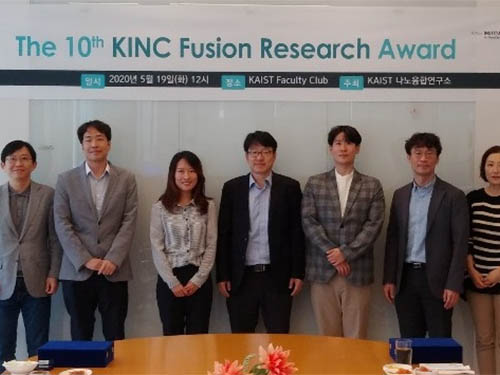 The 10th KINC Fusion Research Awardees
The KAIST Institute for NanoCentury (KINC) recognized three distinguished researchers whose convergence studies made significant impacts. The KINC presented the 10th KINC Fusion Research Awards during a ceremony that took place at KAIST’s main campus in Daejeon on May 19.
This year’s ‘best’ convergence research award went to a joint research group led by Professor Hee Tak Kim from the Department of Chemical and Biomolecular Engineering and Professor Sang Ouk Kim from the Department of Materials Science and Engineering. Their research, featured in the December 27 issue of Advanced Materials as a front cover article last year, introduced the world’s first high-energy efficiency, membraneless, flowless, zinc-bromine battery. This study, in which research professor Gyoung Hwa Jeong, postdoctoral researcher Yearin Byun, and PhD candidate Ju-Hyuck Lee took part as co-lead authors, is deemed as an example of a best practice in convergence research in which two groups’ respective expertise in the fields of carbon materials and electrochemical analysis created a synergistic effect.
Professor Bumjoon Kim from the Department of Chemical and Biomolecular Engineering was also recognized for having published the most interdisciplinary research papers on polymer electronics and nanomaterials at home and abroad.
Professor Hee-Tae Jung, the Director of KINC and the host of the KINC Fusion Research Awards, said, “The KINC is happy to announce the 10th awardees in nano-fusion research this year. Since convergence is crucial for making revolutionary changes, the importance of convergence studies should be recognized. Our institute will spare no effort to create a research environment suitable for convergence studies, which will be crucial for making a significant difference.”
The KINC was established in June 2006 under the KAIST Institute with the mission of facilitating convergence studies by tearing down boarders among departments and carrying out interdisciplinary joint research. Currently, the institute is comprised of approximately 90 professors from 13 departments. It aims to become a hub of university institutes for nano-fusion research.
(END)
2020.05.19 View 13822
The 10th KINC Fusion Research Awardees
The KAIST Institute for NanoCentury (KINC) recognized three distinguished researchers whose convergence studies made significant impacts. The KINC presented the 10th KINC Fusion Research Awards during a ceremony that took place at KAIST’s main campus in Daejeon on May 19.
This year’s ‘best’ convergence research award went to a joint research group led by Professor Hee Tak Kim from the Department of Chemical and Biomolecular Engineering and Professor Sang Ouk Kim from the Department of Materials Science and Engineering. Their research, featured in the December 27 issue of Advanced Materials as a front cover article last year, introduced the world’s first high-energy efficiency, membraneless, flowless, zinc-bromine battery. This study, in which research professor Gyoung Hwa Jeong, postdoctoral researcher Yearin Byun, and PhD candidate Ju-Hyuck Lee took part as co-lead authors, is deemed as an example of a best practice in convergence research in which two groups’ respective expertise in the fields of carbon materials and electrochemical analysis created a synergistic effect.
Professor Bumjoon Kim from the Department of Chemical and Biomolecular Engineering was also recognized for having published the most interdisciplinary research papers on polymer electronics and nanomaterials at home and abroad.
Professor Hee-Tae Jung, the Director of KINC and the host of the KINC Fusion Research Awards, said, “The KINC is happy to announce the 10th awardees in nano-fusion research this year. Since convergence is crucial for making revolutionary changes, the importance of convergence studies should be recognized. Our institute will spare no effort to create a research environment suitable for convergence studies, which will be crucial for making a significant difference.”
The KINC was established in June 2006 under the KAIST Institute with the mission of facilitating convergence studies by tearing down boarders among departments and carrying out interdisciplinary joint research. Currently, the institute is comprised of approximately 90 professors from 13 departments. It aims to become a hub of university institutes for nano-fusion research.
(END)
2020.05.19 View 13822 -
 WEF-KAIST to Host a Forum Next April in Korea
(President Shin poses with Chairman Schwab at the meeting in Dubai)
President Sung-Chul Shin and Executive Chairman Klaus Schwab of the World Economic Forum agreed to co-host the Fourth Industrial Revolution Forum next April in Seoul during a meeting at the WEF Global Future Councils 2017 held in Dubai November 11-12.
Next April’s forum will be a follow-up event of the roundtable discussion KAIST and the WEF Center for the Fourth Industrial Revolution co-hosted in October in Seoul. The two hosted the roundtable discussion titled “Mastering the Fourth Industrial Revolution: The Future of Jobs and Inclusive Growth in Korea.”
During the annual meeting in Dubai, Chairman Schwab expressed his deep appreciation to President Shin for hosting the roundtable discussion and proposed a full-fledged forum in partnership with KAIST once again, which Chairman Schwab will be scheduled to attend.
Chairman Schwab emphasized once again that Korea, who has the world’s top high-end technologies such as 5G telecommunications and semiconductor memory, will be the best fit to realize the Fourth Industrial Revolution most rapidly. He also expressed his great interest in the city of Daejeon in which is being considered to become the Special City for the Fourth Industrial Revolution.
The Global Future Council of the WEF is the interdisciplinary knowledge network dedicated to promoting innovative thinking on the future. The annual council convenes in Dubai the most relevant and knowledgeable thought leaders from academia, government, business, and civil society to challenge conventional thinking and develop new insights and perspectives on key global systems, as well as the impact and governance of key emerging technologies. This year, more than 850 world-leading experts from 74 countries participated.
Under the theme of ‘Vision 2030,’ participants explored systematic changes in key areas such as energy, mobility, and infrastructure while reflecting on the impact of technological breakthroughs in artificial intelligence, biotechnology, and other areas related to the Fourth Industrial Revolution.
2017.11.13 View 9158
WEF-KAIST to Host a Forum Next April in Korea
(President Shin poses with Chairman Schwab at the meeting in Dubai)
President Sung-Chul Shin and Executive Chairman Klaus Schwab of the World Economic Forum agreed to co-host the Fourth Industrial Revolution Forum next April in Seoul during a meeting at the WEF Global Future Councils 2017 held in Dubai November 11-12.
Next April’s forum will be a follow-up event of the roundtable discussion KAIST and the WEF Center for the Fourth Industrial Revolution co-hosted in October in Seoul. The two hosted the roundtable discussion titled “Mastering the Fourth Industrial Revolution: The Future of Jobs and Inclusive Growth in Korea.”
During the annual meeting in Dubai, Chairman Schwab expressed his deep appreciation to President Shin for hosting the roundtable discussion and proposed a full-fledged forum in partnership with KAIST once again, which Chairman Schwab will be scheduled to attend.
Chairman Schwab emphasized once again that Korea, who has the world’s top high-end technologies such as 5G telecommunications and semiconductor memory, will be the best fit to realize the Fourth Industrial Revolution most rapidly. He also expressed his great interest in the city of Daejeon in which is being considered to become the Special City for the Fourth Industrial Revolution.
The Global Future Council of the WEF is the interdisciplinary knowledge network dedicated to promoting innovative thinking on the future. The annual council convenes in Dubai the most relevant and knowledgeable thought leaders from academia, government, business, and civil society to challenge conventional thinking and develop new insights and perspectives on key global systems, as well as the impact and governance of key emerging technologies. This year, more than 850 world-leading experts from 74 countries participated.
Under the theme of ‘Vision 2030,’ participants explored systematic changes in key areas such as energy, mobility, and infrastructure while reflecting on the impact of technological breakthroughs in artificial intelligence, biotechnology, and other areas related to the Fourth Industrial Revolution.
2017.11.13 View 9158 -
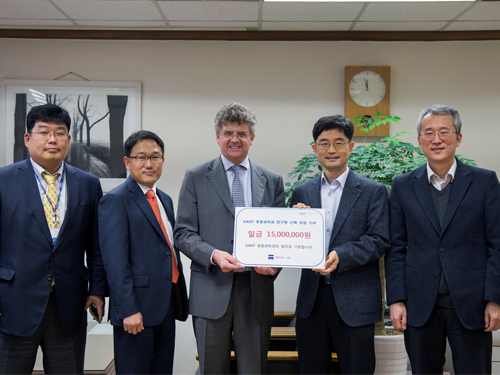 More Donations Arrive to Establish the New Medicine Research and Development Center on Campus
A raft of businesses continues to make donations to establish a new medicine research and development center on campus. The Department of Biological Sciences at KAIST is leading the fundraising campaign.
On November 9, 2015, Nikon Instruments Korea Co., Ltd. contributed USD 8,500 to the fundraising, followed by Carl Zeiss AG and Three-Shine Inc., which donated USD 12,800 and 8,500, respectively.
Bruno Lin, an Executive Director at Carl Zeiss AG in Korea, said, “I’m very glad to participate in this fundraising initiative for the Biological Sciences Department at KAIST, one rapidly reaching out to the world.”
From the left in the picture are Vice President Tae-Hoon Kim, Director Gyu-Hyeok Lee, and Executive Director Bruno Lin of Carl Zeiss AG, Byung-Ha Oh, Dean of the Biological Sciences Department, and Professor Eunjoon Kim.
From the left in the picture are Byung-Ha Oh, Dean of the Biological Sciences Department, President Chun-Gui Park of Three-Shine Inc., and Professor Daesoo Kim.
President Chun of Three-Shine Inc., said, “We hope that the Department of Biological Sciences at KAIST, aided by the construction of new research center, will produce practical research achievements and stand on the frontier of new medicine development research in Korea.”
The New Medicine Research and Development Center will be equipped with state-of-the-art, purpose-built research facilities to support convergent, interdisciplinary research in biomedicine.
2015.11.27 View 7769
More Donations Arrive to Establish the New Medicine Research and Development Center on Campus
A raft of businesses continues to make donations to establish a new medicine research and development center on campus. The Department of Biological Sciences at KAIST is leading the fundraising campaign.
On November 9, 2015, Nikon Instruments Korea Co., Ltd. contributed USD 8,500 to the fundraising, followed by Carl Zeiss AG and Three-Shine Inc., which donated USD 12,800 and 8,500, respectively.
Bruno Lin, an Executive Director at Carl Zeiss AG in Korea, said, “I’m very glad to participate in this fundraising initiative for the Biological Sciences Department at KAIST, one rapidly reaching out to the world.”
From the left in the picture are Vice President Tae-Hoon Kim, Director Gyu-Hyeok Lee, and Executive Director Bruno Lin of Carl Zeiss AG, Byung-Ha Oh, Dean of the Biological Sciences Department, and Professor Eunjoon Kim.
From the left in the picture are Byung-Ha Oh, Dean of the Biological Sciences Department, President Chun-Gui Park of Three-Shine Inc., and Professor Daesoo Kim.
President Chun of Three-Shine Inc., said, “We hope that the Department of Biological Sciences at KAIST, aided by the construction of new research center, will produce practical research achievements and stand on the frontier of new medicine development research in Korea.”
The New Medicine Research and Development Center will be equipped with state-of-the-art, purpose-built research facilities to support convergent, interdisciplinary research in biomedicine.
2015.11.27 View 7769 -
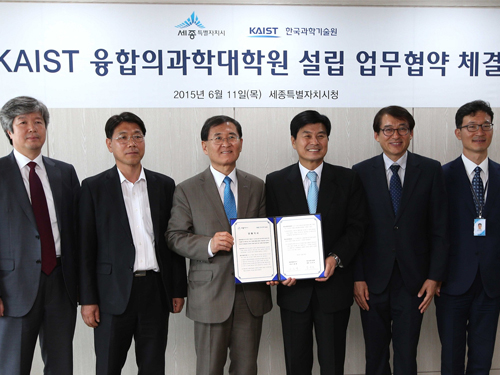 KAIST and Sejong City Goverment Agree to Establish a Graduate School of Medical Science and Engineering
KAIST and the government of Sejong City will cooperate to establish a graduate school of medical science and engineering. On June 11, 2015, President Steve Kang of KAIST and Mayor Choon-Hee Lee of Sejong City signed a memorandum of understanding at the city hall of Sejong to establish the school.
Under the agreement, the two organizations will work out details to establish the graduate school in Sejong on such issues as administrative assistance, financial support, curriculum development, and the creation of an environment conducive to the growth of medical science.
President Kang said, “Once this graduate school is established, KAIST will be able to offer Korea and the world top-notch researchers in the field of medical science. I have high hopes that the school will produce high-impact research breakthroughs and lead in the advancement of interdisciplinary studies in biotechnology.”
In the picture below, President Steve Kang of KAIST (third from the left) holds the signed memorandum of understanding with Mayor Choon-Hee Lee of Sejong (fourth from the left).
2015.06.16 View 6866
KAIST and Sejong City Goverment Agree to Establish a Graduate School of Medical Science and Engineering
KAIST and the government of Sejong City will cooperate to establish a graduate school of medical science and engineering. On June 11, 2015, President Steve Kang of KAIST and Mayor Choon-Hee Lee of Sejong City signed a memorandum of understanding at the city hall of Sejong to establish the school.
Under the agreement, the two organizations will work out details to establish the graduate school in Sejong on such issues as administrative assistance, financial support, curriculum development, and the creation of an environment conducive to the growth of medical science.
President Kang said, “Once this graduate school is established, KAIST will be able to offer Korea and the world top-notch researchers in the field of medical science. I have high hopes that the school will produce high-impact research breakthroughs and lead in the advancement of interdisciplinary studies in biotechnology.”
In the picture below, President Steve Kang of KAIST (third from the left) holds the signed memorandum of understanding with Mayor Choon-Hee Lee of Sejong (fourth from the left).
2015.06.16 View 6866 -
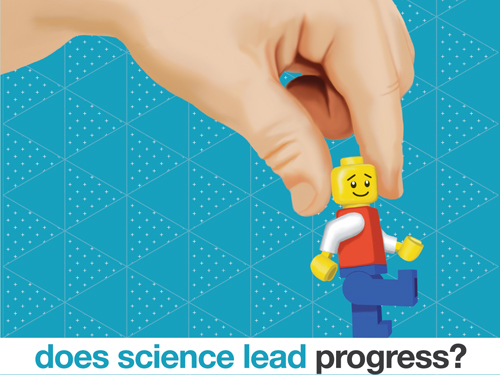 The ICISTS-KAIST International Conference from August 4-8, 2014 in KAIST Campus, Korea
"Does science lead progress?"
This thought-provoking question will be explored this summer with hundreds of university students gathered from all around the world at the campus of the Korea Advanced Institute of Science and Technology (KAIST), a leading science and technology university in Korea.
Established in 2005, the International Conference for Integration of Science, Technology and Society (ICISTS)-KAIST has been hosted every summer for Korean and international university students in Daejeon, Republic of Korea. The conference features distinguished speakers from academia, business, and public sectors and enables participants to exchange views, identify issues affecting science and society, and explore possible solutions.
The ICISTS-KAIST is the largest interdisciplinary conference in Asia. It is organized by undergraduate students of KAIST and promotes the idea of a science- and technology-integrated society through international cooperation of college students from diverse backgrounds. Last year alone, about 400 participants from 103 universities in 25 countries attended the conference.
Marking the 10th anniversary, the ICISTS-KAIST International Conference 2014 will scrutinize the fundamental aspect of scientific and technological progress versus social advancement under the theme of "Does Science Lead Progress?"
"We hope that the conference provides students with an interactive platform to look into some of the essential, yet easily neglected, questions such as the purpose of science and technology education in a broader context of social values," said Dong-Yeon Woo, President of Organizing Committee for the ICISTS-KAIST International Conference 2014.
Among keynote speakers are Langdon Winner, a professor of Science and Technology Studies at Rensselaer Polytechnic Institute, Stephen Hilgartner, an associate professor of Science and Technology Studies at Cornell University, and Steve Breyman, an associate professor of Science and Technology Studies at Rensselaer Polytechnic Institute.
Langdon Winner will speak about the fallacy of the public perception that technological innovation leads to social revolution (his presentation is entitled "The Myth of Innovation"). Stephen Hilgartner will present four aspects of the politics of vision in today's science and technology ("Science, Technology, and the Politics of Vision"), and Steve Breyman will talk about the origin of scientific deception, misrepresentation, and prevarication ("The Agnotology of Hydrofracking").
The conference lasts five days, beginning on August 4th through August 8th, 2014 at KAIST campus. For participation, regular online application opens until July 11, 2014 at http://www.icists.org.
2014.07.04 View 9937
The ICISTS-KAIST International Conference from August 4-8, 2014 in KAIST Campus, Korea
"Does science lead progress?"
This thought-provoking question will be explored this summer with hundreds of university students gathered from all around the world at the campus of the Korea Advanced Institute of Science and Technology (KAIST), a leading science and technology university in Korea.
Established in 2005, the International Conference for Integration of Science, Technology and Society (ICISTS)-KAIST has been hosted every summer for Korean and international university students in Daejeon, Republic of Korea. The conference features distinguished speakers from academia, business, and public sectors and enables participants to exchange views, identify issues affecting science and society, and explore possible solutions.
The ICISTS-KAIST is the largest interdisciplinary conference in Asia. It is organized by undergraduate students of KAIST and promotes the idea of a science- and technology-integrated society through international cooperation of college students from diverse backgrounds. Last year alone, about 400 participants from 103 universities in 25 countries attended the conference.
Marking the 10th anniversary, the ICISTS-KAIST International Conference 2014 will scrutinize the fundamental aspect of scientific and technological progress versus social advancement under the theme of "Does Science Lead Progress?"
"We hope that the conference provides students with an interactive platform to look into some of the essential, yet easily neglected, questions such as the purpose of science and technology education in a broader context of social values," said Dong-Yeon Woo, President of Organizing Committee for the ICISTS-KAIST International Conference 2014.
Among keynote speakers are Langdon Winner, a professor of Science and Technology Studies at Rensselaer Polytechnic Institute, Stephen Hilgartner, an associate professor of Science and Technology Studies at Cornell University, and Steve Breyman, an associate professor of Science and Technology Studies at Rensselaer Polytechnic Institute.
Langdon Winner will speak about the fallacy of the public perception that technological innovation leads to social revolution (his presentation is entitled "The Myth of Innovation"). Stephen Hilgartner will present four aspects of the politics of vision in today's science and technology ("Science, Technology, and the Politics of Vision"), and Steve Breyman will talk about the origin of scientific deception, misrepresentation, and prevarication ("The Agnotology of Hydrofracking").
The conference lasts five days, beginning on August 4th through August 8th, 2014 at KAIST campus. For participation, regular online application opens until July 11, 2014 at http://www.icists.org.
2014.07.04 View 9937 -
 KAIST and Coverity sign MOU for the Analysis of Static in Software
KAIST signed an ‘Interdisciplinary Cooperation in Software Static Analysis Agreement’ with America’s Coverity (representative: Anthony Bettencourt) on the 24th of February.
Dignitaries like Dean of the department of Computer Science of KAISt Choi Gee Son and Andy Chow CTO of Coverity attended the ceremony.
The agreement will allow the application of Coverity’s family of integral product software to research and education at KAIST. This will strengthen KAIST’s ability to develop software and be used in the education of software quality related subjects.
CTO of Coverity Andy Chow had a special seminar for KAIST researches and students after the signing on the topic of ‘Understanding the Present Condition of Static Analysis Technology and its Future’.
Rich Cerruto, in charge of Coverity in Asia, commented that the software developed by Coverity is being used by Samsung, LG electronics, and other domestic companies carrying out R&D for product quality improvement and that he hopes that through this agreement the development of quality-driven software will be educated in a structural manner in the domestic education market together with KAIST.
Coverity has signed MOU with other major universities like Stanford University, Carnegie Mellon University, and UC Berkeley but KAIST is the first in Asia to sign.
2011.03.02 View 11930
KAIST and Coverity sign MOU for the Analysis of Static in Software
KAIST signed an ‘Interdisciplinary Cooperation in Software Static Analysis Agreement’ with America’s Coverity (representative: Anthony Bettencourt) on the 24th of February.
Dignitaries like Dean of the department of Computer Science of KAISt Choi Gee Son and Andy Chow CTO of Coverity attended the ceremony.
The agreement will allow the application of Coverity’s family of integral product software to research and education at KAIST. This will strengthen KAIST’s ability to develop software and be used in the education of software quality related subjects.
CTO of Coverity Andy Chow had a special seminar for KAIST researches and students after the signing on the topic of ‘Understanding the Present Condition of Static Analysis Technology and its Future’.
Rich Cerruto, in charge of Coverity in Asia, commented that the software developed by Coverity is being used by Samsung, LG electronics, and other domestic companies carrying out R&D for product quality improvement and that he hopes that through this agreement the development of quality-driven software will be educated in a structural manner in the domestic education market together with KAIST.
Coverity has signed MOU with other major universities like Stanford University, Carnegie Mellon University, and UC Berkeley but KAIST is the first in Asia to sign.
2011.03.02 View 11930 -
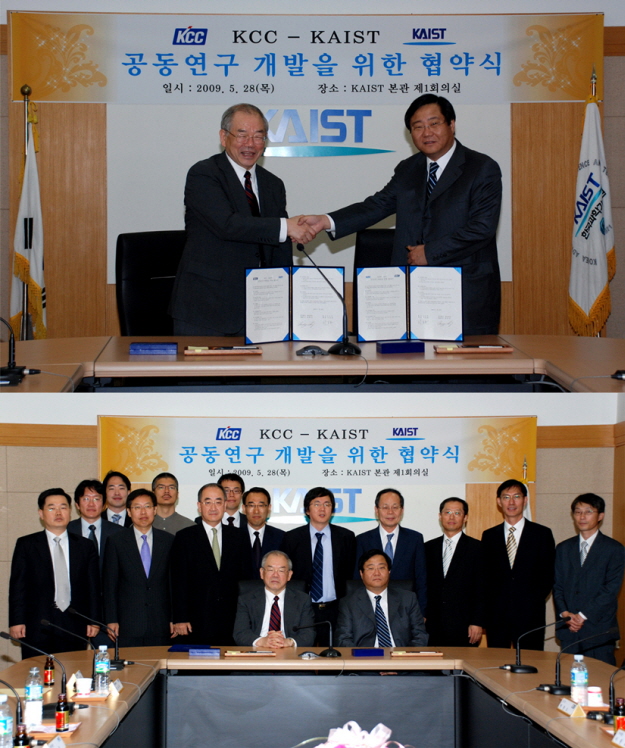 KAIST Signs Agreement for Industry-Academia Cooperation with KCC
KAIST signed an agreement for industry-academia cooperation with KCC, Korea"s leading supplier of building & industrial materials, on May 28, university sources said.
The agreement signed by KAIST President Nam-Pyo Suh and Mong-Jin Chung, Chairman of the KCC Business Group, calls for KAIST and KCC to conduct joint research for the development of new technologies in nano science, new materials areas and interdisciplinary areas.
Under the agreement, KCC will invest 5 billion won into the KAIST Institute for the NanoCentury over the next five years.
KCC Chairman Chung said: "Through this industry-academia cooperation agreement, we are seeking to give part of our profits back to community . We hope this agreement to contribute to the development of core technologies of the future in the new materials field, and nurturing specialized manpower."
2009.05.28 View 13696
KAIST Signs Agreement for Industry-Academia Cooperation with KCC
KAIST signed an agreement for industry-academia cooperation with KCC, Korea"s leading supplier of building & industrial materials, on May 28, university sources said.
The agreement signed by KAIST President Nam-Pyo Suh and Mong-Jin Chung, Chairman of the KCC Business Group, calls for KAIST and KCC to conduct joint research for the development of new technologies in nano science, new materials areas and interdisciplinary areas.
Under the agreement, KCC will invest 5 billion won into the KAIST Institute for the NanoCentury over the next five years.
KCC Chairman Chung said: "Through this industry-academia cooperation agreement, we are seeking to give part of our profits back to community . We hope this agreement to contribute to the development of core technologies of the future in the new materials field, and nurturing specialized manpower."
2009.05.28 View 13696 -
 KAIST Professor Named International Research Grant Reviewer
Prof. Kwang-Hyun Cho of the Department of Bio and Brain Engineering, KAIST, was appointed as a research grant review committee member of the international Human Frontier Science Program (HFSP) for 2008-2009, university authorities reported.
The HFSP is a funding agency that supports international collaboration in interdisciplinary, basic research in the life sciences. It was initiated in 1989 by G7 countries as the sole funding program for international researches in neuroscience and molecular biology. The HFSP now has a membership of 35 countries and Korea joined the program in 2004. Prof. Cho will be responsible for reviewing grant applications in the field of systems biology.
Prof. Cho received B.S., M.S. and Ph.D. degrees in electrical engineering from KAIST in 1993, 1995, and 1998, respectively. He has been working as a director of the KAIST Institute for the BioCentury and KAIST"s Laboratory for Systems Biology and Bio-Inspired Engineering. He has been serving on editorial advisory boards of various international science journals, including Systems and Synthetic Biology (Springer, Netherlands, from 2006), BMC Systems Biology (BMC, London, U.K., from 2007) and Gene Regulation and Systems Biology (Libertas Academica, New Zealand, from 2007).
He is a senior member of the Engineering in Medicine and Biology Society (EMBS) affiliated with the Institute of Electronics and Electrical Engineers (IEEE). His research interests cover the areas of systems science with bio-medical applications, especially systems biology and bio-inspired engineering based on molecular systems biology.
2008.07.18 View 19451
KAIST Professor Named International Research Grant Reviewer
Prof. Kwang-Hyun Cho of the Department of Bio and Brain Engineering, KAIST, was appointed as a research grant review committee member of the international Human Frontier Science Program (HFSP) for 2008-2009, university authorities reported.
The HFSP is a funding agency that supports international collaboration in interdisciplinary, basic research in the life sciences. It was initiated in 1989 by G7 countries as the sole funding program for international researches in neuroscience and molecular biology. The HFSP now has a membership of 35 countries and Korea joined the program in 2004. Prof. Cho will be responsible for reviewing grant applications in the field of systems biology.
Prof. Cho received B.S., M.S. and Ph.D. degrees in electrical engineering from KAIST in 1993, 1995, and 1998, respectively. He has been working as a director of the KAIST Institute for the BioCentury and KAIST"s Laboratory for Systems Biology and Bio-Inspired Engineering. He has been serving on editorial advisory boards of various international science journals, including Systems and Synthetic Biology (Springer, Netherlands, from 2006), BMC Systems Biology (BMC, London, U.K., from 2007) and Gene Regulation and Systems Biology (Libertas Academica, New Zealand, from 2007).
He is a senior member of the Engineering in Medicine and Biology Society (EMBS) affiliated with the Institute of Electronics and Electrical Engineers (IEEE). His research interests cover the areas of systems science with bio-medical applications, especially systems biology and bio-inspired engineering based on molecular systems biology.
2008.07.18 View 19451